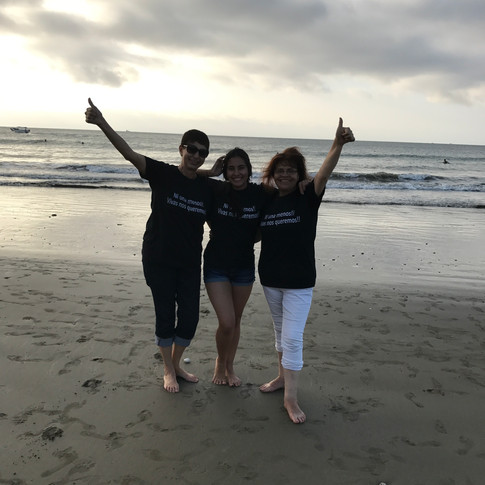Week 5
- Jul 2, 2017
- 4 min read
Margarita and I traveled to Ibarra and Portoviejo. Before our travels Dolores and Margarita had traveled to Cuenca.
Cuenca:
Both, Margarita and Dolores, said the event went smoothly, 4 authorities where present and a debate started between women and authorities. One of the main demands of the women of Cuenca was the employability of women and the gap in salaries and representatives. The women of Cuenca demanded economic independence.
Ibarra:
We started early. Authorities of Imbabura province (the province of which Ibarra is capital) were very puntual. The Governor of Imbabura, an indigenous women who came from the academy into public life and is bilingual (kichwa and spanish) was the first to arrive, then the Vice-Prefect of Imbabura, then a Councilor of Ibarra and finally the only male authority present the Vice-Mayor of Ibarra arrived. All of them gave speeches and recognized the importance of women for the development of the region, their province and the city. All of them highlighted the fact that work towards gender equality and women empowerment has being done but "there is still a long way to go". All the authorities signed the letter of commitment and where happy to hear what the women had to say.
When the women spoke there wasn't a open debate just a demand of what they want and need. The main demand in Ibarra is a shelter for women who have being victims of domestic violence. The growing presence of women refugees (due to the crisis in Venezuela) was also mentioned. Finally, the two women who the councilor brought talk about her time in office and how wonderful her work has being. The speech the two women offered at the end was very politicized but offered a learning experience for me. Every time there is a open event with media (interviews with some of the women, the authorities and Margarita were held) politicians will look for a space to campaign themselves. As they say "politicians are always campaigning".
Portoviejo:
Portoviejo was outstanding. Everything was on time, there were 14 authorities and around 50 women present (in Ibarra and Cuenca the maximum had being 25). The women were organized and they carried a T-shirt that read "Vivas nos queremos" (We want us alive). The message has a particular significance due to the growing number of violence against women in Latin America. Furthermore, the biggest demand in Portoviejo and even the motto they proposed for their agenda was "Portoviejo reborns without violence".
Some context is necessary. On April 16th, 2016 Manabí province, of which Portoviejo is the capital city, was shaken by a 7.8 earthquake that nearly destroyed the province. Authorities affirm the number of deaths was around 700 but people in the province say it is much higher. The catastrophe took thousands of homes and business along with the life of many manabitas (demonym for the people of Manabí). Furthermore, Manabí's economy was extremely affected. The center of Portoviejo which was one of the commercial hearts of Manabí was destroyed. This is why the women said "Portoviejo reborns" the violence part only shows how big the problem is and how desperate they are to change the situation.
Every authority spoke and affirm their compromise to women and the eradication of violence, one counselor even spoke about workshops their are reciving in the city hall of Portoviejo, this workshops he said are being held to target gender inequality, chauvinism and to work with masculinities. He brought to light the lack of knowledge of authorities, not about violence, but about why violence is produced and how it is perpetrated in every area of our experience. When the women spoke there was a candid debate, the women even questioned the representative of the mayor (who said he couldn't attend because the president of Ecuador was visiting Portoviejo that same day): "If women were a priority with our without President he will be here" they said. Furthermore, women spoke about the lack of security in public transportation and about how gender stereotypes are also perpetrated by women. Someone offered and example "I was riding the bus and heard a women talk to another, my son's wife is a good for nothing. She never irons his shirts or cooks for him. He should leave her and find a better one."
The strength the women of Portoviejo displayed, the arguments they offered and the certainty of some of their solutions was a pleasant surprise for me. As well, the coverage by the media was huge. The women's, authorities and Margarita well interview for local newspapers and news broadcasts.
After the event I had the opportunity to assist to a women's group meeting and it was a completely new and interesting experience to see how women organized themselves to act outside of Quito. They were very strategic and aware of the challenges they faced.
Conclusions:
Both Ibarra and Portoviejo were important learning experiences. They brought different lessons and show me the particularities of their very different regions (Portoviejo is located in the coast and Ibarra in highlands). The way authorities responded to the demands and the way the women demanded what they deem necessary was different and a lesson in itself. Once more I was remembered of how important it is for a politician to stay close to its people but also to how to play the public officer role. Furthermore, being able to be part of a civil society meeting was very important since I was able to see how civil society and women's groups organize themselves outside big cities.




























Comments